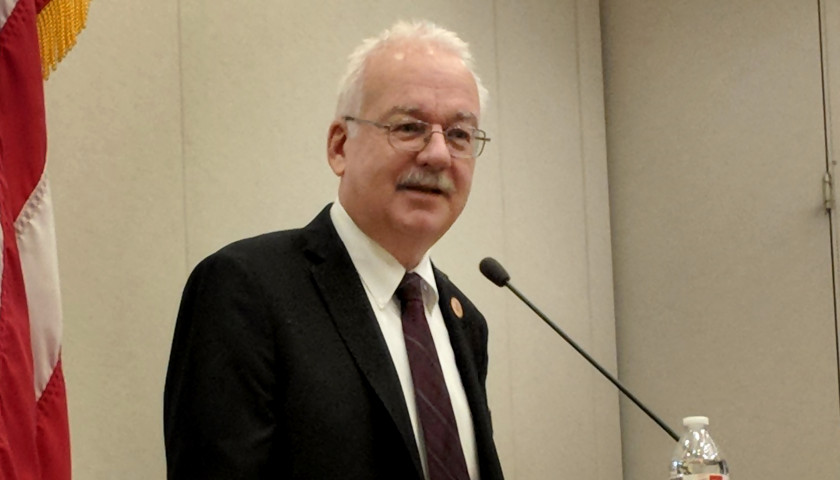One of the bills passed this year in the Arizona Legislature and signed by the governor, HB 2567, adds rules for independent community oversight of Arizona police departments. Although Arizona isn’t plagued like some states by high-profile incidents involving law enforcement, overall community concern led to the legislation.
State Rep. John Kavanagh (R-Fountain Hills) (pictured above), who comes from a law enforcement background and sponsored the bill, said, “I’m not throwing cops to the wolves, especially politically motivated wolves.”
Arizona has the fourth highest rate of police killings among states, but has relatively few complaints about the police. Most major U.S. cities, as well as several cities in Arizona, including Chandler and Tucson, have these boards. The city of Phoenix is in the process of forming one.
The measure, A.R.S. 38-1117 (which will be added to title 38), will require two-thirds of most bodies that review police misconduct to be law enforcement officers from the same department where the misconduct took place. All members of civilian review boards are required to have at least 80 hours of community college or AZPOST-certified police training. The education must include 20 hours of simulated event training.
The ACLU of Arizona opposed the bill, saying it “will result in bad officers remaining on our streets.” In a letter to Arizona Governor Doug Ducey, the organization’s policy director, Darrell Hill, objected to the two-thirds requirement, saying “civilian review boards must represent the communities and neighborhoods that are most heavily policed.”
Tim Sparling of Arizona Attorneys for Criminal Justice criticized the training requirement, according to ABC 15. “If you have the time and the money, you also have to qualify for the program, in order to get the training, which again, requires a certain amount of education, it effectively eliminates anyone who’s not a police officer,” he said.
However, James Pasco, then-national executive director of the Fraternal Order of Police, told NPR in 2015, “The fact of the matter is, an officer has to make a split-second decision involving life or death, and the civilian review boards tend to, by definition, be made up of civilians who have no particular experience or insight into what went through that officer’s mind, what the circumstances were and how desperate things can become in that nanosecond.”
Arizona Police Association President Joe Clure explained why the training requirement was added during a March legislative committee hearing on the bill. “The bill trains people, educates people on what police officers do on a day-to-day basis,” he testified.
Professor Douglas Perez, a former law enforcement officer, said in his book, Common Sense About Police Review, that police officers prefer Internal Affairs to civilian review boards because the boards are “operated by individuals unfamiliar with police work.”
Civilian review boards stacked with civilians may actually treat police officers under investigation more leniently than boards made up of police officers. A study commissioned by the Los Angeles City Council in 2017 found that “civilian members of the boards that weigh major LAPD discipline cases are “consistently more lenient” than their sworn counterparts, frequently voting to acquit officers or dole out lesser punishments.” The civilian panels examined during the study never issued a stronger decision than the police chief.
A similar study this year in Los Angeles revealed the same results. The all-civilian panels recommended a lesser penalty more than 70% of the time — leaving 11 officers on the force who otherwise would have been fired. The traditional panels consist of two officers and one civilian.
Civilians who participate in Los Angeles review boards have heftier background requirements than under the Arizona law. They must have two years of experience in human resources, personnel or labor relations, or another position that administers or adjudicates employee discipline. If selected, they must complete an eight-hour training course in rules of evidence and other legal procedures.
The city of Seattle was one of the first cities to set up a civilian review board in the 1990s, but the Department of Justice placed it under federal oversight in recent years due to “a pattern or practice of excessive force that violates the U.S. Constitution and federal law.”
According to The Gazette, leaders of Black Lives Matter, the ACLU and other civil rights organizations don’t like the Los Angeles citizens review board. Colorado Springs Mayor John Suthers doesn’t like the boards either. He told The Gazette he researched civilian review boards because “I can’t stand bad cops.” But he concluded they do not work. “In my opinion, I think cops are tougher on cops than most people think.”
Samuel Walker, author of Police Accountability: The Role of Citizen Oversight, said one key thing that can be done to improve police behavior is to make information about police disciplinary records available to the public. Arizona currently makes this information public, while some of the states with contentious police violence do not, including the blue states of California, New York, Maryland, Oregon, as well as Washington, D.C.
– – –
Rachel Alexander is a reporter at the Arizona Sun Times and The Star News Network. Follow Rachel on Twitter. Email tips to [email protected].
Photo “State Rep John Kavanaugh” by State Rep Kavanaugh.








